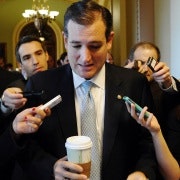A Syrian minefield of Obama's own making
In baseball they call it “out of left field”. US President Barack Obama’s decision on Saturday to seek Congress’s approval for strikes on Syria ranks as the least expected moment of his presidency – and among the riskiest. His immediate fortunes are now in the hands of two very unfriendly entities: the Assad regime in Syria and the Republican Party on Capitol Hill. Both have been handed their leverage. Neither can be relied upon to use it predictably. There can be little doubt that Obama is entering a very dangerous phase of his presidency, to some degree voluntarily.
First, the positive side. Barack Obama’s request, which Congress will debate only in the week beginning September 9, has bought him time to push for a diplomatic solution. On Tuesday he travels to St Petersburg for the conference of the Group of 20 leading nations. Last month he turned down an invitation from President Vladimir Putin to hold a bilateral meeting in Moscow after the summit. By postponing strikes for at least 10 days, he opens a window to talk to Putin, the Chinese, the Arab League and other central actors. Hopefully he can prove that diplomacy works with the threat of action. That would be a triumph. But it would be optimistic to suppose Putin and others will take seriously Obama’s threat of strikes before Congress has authorised them. Until then Obama cannot afford to spend too much time out of Washington. Nor can his principals, John Kerry and Chuck Hagel, respectively secretaries of state and defence, both of whom will be needed to testify to Congress.
Obama is confident he will get the green light from both houses, as George W Bush did for the 2002 bill authorising the Iraq war, and as George HW Bush did – though by a far narrower Senate majority – for the first Iraq war in 1990. No president has been turned down since the War Powers Act passed in 1973 – though few have bothered to ask. Should Obama win his authorisation next week, or the week after, he will emerge stronger at home and abroad. At home, he will have acquired co-ownership with Congress of whatever happens in Syria. At a moment when a large majority of Americans are sceptical of military action, the president’s hope is to make it bipartisan. His political instinct is sound. Abroad, it will strengthen his credibility too. A Yes vote would demonstrate US exceptionalism at its best – burying its political differences to respond to the barbaric gassing of hundreds of innocent foreign children.
That is the plan. But after the UK parliament’s 'No' vote last week, it is hard to be sure it will go to script. The mathematics in both the Democratic and Republican parties are too fluid to forecast a clear majority, even though that must still be the probability. There will be plenty of Republican hawks, such as John McCain, and reliable Democratic centrists, such as Max Baucus, in favour of the bill. They will be joined by some liberal hawks, such as Nancy Pelosi, Democratic House leader. But isolationist Tea Party Republicans have teamed up with Democratic liberals in the past to defeat legislation. It is not inconceivable they will do so again. A defeat would be disastrous for Obama, who would then have to choose between flouting the will of Congress or becoming a lame duck on the global stage.
We must assume the White House is able to count votes better than David Cameron. The alternative is too dire. Either way, Washington is about to be consumed by a debate over America’s role in the world and the future of Obama’s presidency. Assuming he is less incompetent than the UK prime minister, by far his biggest hurdle will come on the ground in the Middle East. Colin Powell, former secretary of state, once said of Iraq: “You break it, you own it.” If the president gets the approval he wants, the US will from that moment own responsibility for what happens in Syria. This is his real gamble. Could he be hoping subconsciously that Congress votes No, as some have rather wildly suggested? Or has the UK vote, among other twists, made him far less reluctant on Syria than he was?
Whatever has bolstered Obama’s resolve for war, that is the course he is asking America to approve. On Friday John McCain spoke for many when he dismissed the UK parliament’s No vote as a “symbol of Britain’s withdrawal as a world power”. That may well be right, although the last time the UK stood aside from a US war was in Vietnam – a quagmire that helped sink two presidencies and haunted most of their successors. It was the costliest blunder in US military history.
The limited nature of Obama’s authorisation request is explicitly designed to prevent a Vietnam-style mission creep in Syria. The language is narrow and confined to punishing the use of chemical weapons. There is no talk of regime change. Yet McCain and others want a more robust resolution calling for Bashar al-Assad’s removal. And Assad himself will surely respond in ways that make it hard for the US simply to walk away.
Much as Lyndon Johnson hoped escalation in Vietnam would help him get out quicker, the president risks getting into a game of poker he cannot control. He would, of course, be doing so in tandem with Congress. And it would be with the best of intentions. Perhaps there was no choice. But that is no insurance against the unexpected. For better or worse, Obama is making a big gamble on Syria.
Copyright The Financial Times Limited 2013.
















